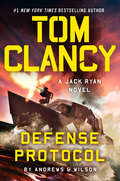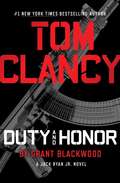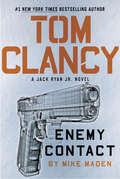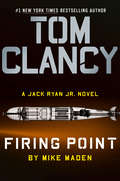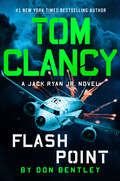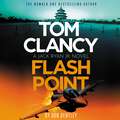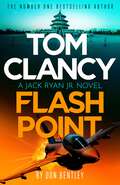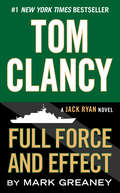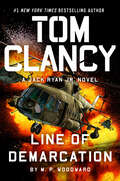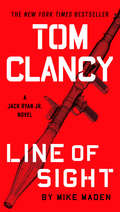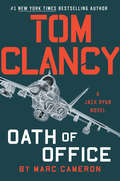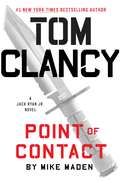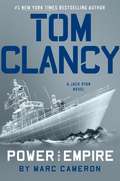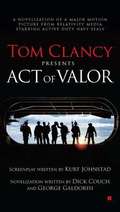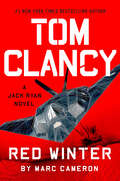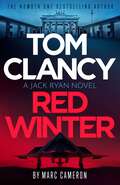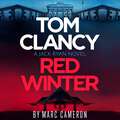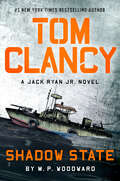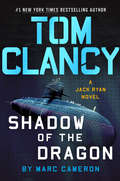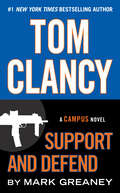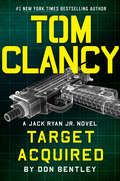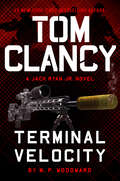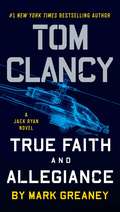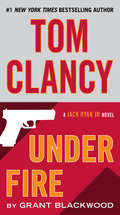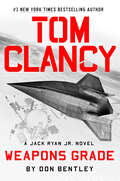- Table View
- List View
Tom Clancy Defense Protocol (A Jack Ryan Novel)
by Brian Andrews Jeffrey WilsonThe stakes are sky-high when a power-mad Chinese president threatens Taiwan in the #1 New York Times bestselling Jack Ryan series. For decades, Taiwan has been a thorn in the side of the Chinese government. An independent nation to the rest of the world, it is considered a rogue province by the PRC. Previous governments have tried to conquer the island using economic force and diplomatic pressure, but new Chinese President Li Jian Jun is done fooling around. He&’s devised a secret military operation to take the island. Only one man knows how to stop Li&’s mad and bloody plan for reunification and that&’s Minister of Defense Qin Haiyu. Fearing for his life and the safety of his family, Qin covertly makes contact with the CIA in Beijing and signals his desire to defect to the West. To get Qin out, John Clark creates an international task force reminiscent of Rainbow Six and goes undercover in mainland China. Meanwhile, Lt. Commander Katie Ryan is deployed to the tip of the spear on the destroyer USS Jason Dunham to defend Taiwan. Threatened by an encircling Chinese armada, she&’s under pressure to find a flaw in the invaders&’ plan for her father to exploit. For his part, President Jack Ryan may have the power of the entire US military at his disposal, but what he really needs are Li&’s secret plans from Defense Minister Qin so he can stave off a war. Because America&’s Defense Protocol could lead to a game of mutual destruction that could cost the lives of thousands of young soldiers, sailors, special operators as well as his daughter.
Tom Clancy Duty and Honor (A Jack Ryan Jr. Novel #2)
by Grant BlackwoodEven though he’s on forced leave from the clandestine intelligence group known as The Campus, Jack Ryan, Jr., still finds himself caught in the crosshairs after an attempt on his life is thwarted when he turns the tables on his would-be dispatcher. Convinced that the attack is linked to his recent covert actions with the convalescing Iranian national Ysabel Kashini, Jack sets out to find out who wants him dead, and why.<P><P> Using clues found on the now dead assassin, Jack pursues the investigation, following a growing trail of corpses to the European Union’s premier private security firm, Rostock Security Group, and its founder, Jürgen Rostock—a former general in the German Special Forces Command. Rostock is world-renowned as a philanthropist and human rights advocate. But Jack knows him from a Campus mission revolving around a company linked to RSG—a mission that has put him on Rostock’s lethal radar. <P> Without any Campus resources, Jack launches his own shadow campaign to uncover the truth about Rostock and a long-running false-flag war of terror that has claimed thousands of lives. Yet all of that bloodshed is but a precursor to a coming catastrophic event that will solidify Rostock’s place among the global powers. An event that Jack must stop at any cost. <P><b>A New York Times Bestseller</b>
Tom Clancy Enemy Contact (A Jack Ryan Jr. Novel #5)
by Mike MadenJack Ryan, Jr.’s race to stop an international criminal conspiracy is intertwined with the fate of an old friend in this blistering entry in the #1 New York Times bestselling series. <P><P>The CIA's deepest secrets are being given away for a larger agenda that will undermine the entire Western intelligence community. Director of National Intelligence Mary Pat Foley wants it stopped but doesn't know who, how or why. <P><P>Jack Ryan, Jr., is dispatched to Poland on a different mission. The clues are thin, and the sketchy trail dead ends in a harrowing fight from which he barely escapes with his life.If that's not bad enough, Jack gets more tragic news. An old friend, who's dying from cancer, has one final request for Jack. It seems simple enough, but before it's done, Jack will find himself alone, his life hanging by a thread. <P><P>If he survives, he'll be one step closer to finding the shadowy figure behind the CIA leak and its true purpose, but in the process, he'll challenge the world's most dangerous criminal syndicate with devastating consequences. <P><b>A New York Times Bestseller</b>
Tom Clancy Firing Point (A Jack Ryan Jr. Novel #6)
by Mike MadenJack Ryan, Jr. is out to avenge the murder of an old friend, but the vein of evil he's tapped into may run too deep for him to handle in the latest electric entry in the #1 New York Times bestselling series. <p><p> While on vacation in Barcelona, Jack Ryan, Jr. is surprised to run into an old friend at a small café. A first, Renee Moore seems surprised to see Jack, but then she just seems irritated and distracted. After making plans to meet later, Jack leaves, only to miss the opportunity to ever speak to Renee again, as the café is destroyed minutes later by a suicide bomber. A desperate Jack plunges back into the ruins to save his friend, but it's too late. As she dies in his arms, she utters one word, "Sammler." <p> When the police show up they are initially suspicious of Jack until they are called off by a member of the Spanish Intelligence Service. This mysterious sequence of events sends the young Campus operative on an unrelenting search to find out the reason behind Renee's death. Along the way, he discovers that his old friend had secrets of her own—and some of them may have gotten her killed. <p> Jack has never backed down from a challenge, but some prey may be too big for one man. <p><b>A New York Times Bestseller</b>
Tom Clancy Flash Point (A Jack Ryan Jr. Novel #10)
by Don BentleyIf there&’s one thing Jack Ryan, Jr&’s father taught him, it&’s that freedom isn&’t free, but nothing can prepare Jack for the price he must pay in the latest electrifying entry in the #1 New York Times bestselling series.Jack Ryan Jr. is in a world of trouble. When a benign surveillance operation takes a deadly turn, Jack finds himself locked in a struggle with an unseen enemy bent on destroying the Campus. The chase leads Jack to the South China Sea where a midair collision between aircraft from rival nations threatens to serve as a flash point for the entire region. As Jack frantically tries to put the pieces of the conspiracy together, the Campus is hit with a crippling attack. When the dust settles, Jack is one of the few operators still standing and the Campus&’s de facto leader. But the fight is just beginning. As tensions escalate, Jack&’s mysterious adversary executes a brilliant campaign to paralyze the American government even as China inches closer to invading Taiwan. With the odds stacked against him and no help in sight, Jack and his shattered team must stop the world&’s two remaining super powers from stumbling into war even as the noose around the Campus grows ever tighter.Every operation has a cost.This time the bill might just be too much to pay.
Tom Clancy Flash Point (Jack Ryan, Jr. #10)
by Don Bentley Author to revealedOne split second is all it can take . . .Jack Ryan, Jr. finds himself at the scene of a conspiracy to bring the world to the brink of war in the South China sea in the latest breathtaking Tom Clancy thriller.Jack Ryan, Jr. is in a world of trouble. A mid-air collision between aircraft from rival nations in the South China Sea threatens to serve as a flash point for the entire region. As Jack frantically tries to put the pieces of the conspiracy together, the Campus is hit with a crippling attack. When the dust settles, Jack is one of the few operators still standing and the Campus's de facto leader.But the fight is just beginning.As tensions escalate, Jack's mysterious adversary executes a brilliant campaign to paralyze the American government even as China inches closer to invading Taiwan. With the odds stacked against him and no help in sight, Jack and his shattered team must stop the world's two remaining super powers from stumbling into war even as the noose around the Campus grows ever tighter.Every operation has a cost. This time the bill might just be too much to pay. PRAISE FOR TOM CLANCY'Constantly taps the current world situation for its imminent dangers and spins them into an engrossing tale'New York Times'Heart-stopping action . . . entertaining and eminently topical'Washington Post'A virtuoso display of page-turning talent'Sunday Express'Exhilarating. No other novelist is giving so full a picture of modern conflict'Sunday Times'A brilliantly constructed thriller that packs a punch'Daily Mail
Tom Clancy Flash Point (Jack Ryan, Jr. #10)
by Don Bentley Author to revealedOne split second is all it can take . . .Jack Ryan, Jr. finds himself at the scene of a conspiracy to bring the world to the brink of war in the South China sea in the latest breathtaking Tom Clancy thriller.Jack Ryan, Jr. is in a world of trouble. A mid-air collision between aircraft from rival nations in the South China Sea threatens to serve as a flash point for the entire region. As Jack frantically tries to put the pieces of the conspiracy together, the Campus is hit with a crippling attack. When the dust settles, Jack is one of the few operators still standing and the Campus's de facto leader.But the fight is just beginning.As tensions escalate, Jack's mysterious adversary executes a brilliant campaign to paralyze the American government even as China inches closer to invading Taiwan. With the odds stacked against him and no help in sight, Jack and his shattered team must stop the world's two remaining super powers from stumbling into war even as the noose around the Campus grows ever tighter.Every operation has a cost. This time the bill might just be too much to pay. PRAISE FOR TOM CLANCY'Constantly taps the current world situation for its imminent dangers and spins them into an engrossing tale'New York Times'Heart-stopping action . . . entertaining and eminently topical'Washington Post'A virtuoso display of page-turning talent'Sunday Express'Exhilarating. No other novelist is giving so full a picture of modern conflict'Sunday Times'A brilliantly constructed thriller that packs a punch'Daily Mail
Tom Clancy Full Force and Effect (Jack Ryan #10)
by Mark GreaneyA North Korean ICBM crashes into the Sea of Japan. A veteran CIA officer is murdered in Ho Chi Minh City, and a package of forged documents goes missing. The pieces are there, but assembling the puzzle will cost Jack Ryan, Jr. and his fellow Campus agents precious time. Time they don't have. <P><P>The challenge facing President Jack Ryan is an old one with a terrifying new twist. The international stalemate with North Korea continues into its seventh decade. A young, untested dictator is determined to prove his strength by breaking the deadlock. Like his father before him, he hangs his plans on the country's nuclear ambitions. Until now, that program was impeded by a lack of resources. However, there has been a dramatic change in the nation's economic fortune. A rich deposit of valuable minerals have been found in the Hermit Kingdom. Coupled with their nuclear capabilities, the money from this find will make North Korea a dangerous force on the world stage. There's just one more step needed to complete this perfect plan...the elimination of the president of the United States.
Tom Clancy Line of Demarcation (A Jack Ryan Jr. Novel)
by M.P. WoodwardThe discovery of an oil field off the coast of Guyana plunges Jack Ryan, Jr into a cauldron of lies in the latest entry in this New York Times bestselling series.It starts with the destruction of a US Coast Guard cutter and the loss of her entire crew. But the USCG Claiborne was on an innocuous mission to open a sea lane between an oil field off the coast of South America and the refineries of southern Louisiana. The destruction of the ship, tragic as it is, won't stop that mission from continuing.So who would sacrifice twenty-two men and women just to slow down the plan? That's the question plaguing Jack Ryan Jr. He's in Guyana to work a deal to get his company, Hendley Associates, in on the ground floor of this new discovery, but Russia&’s Wagner Group and a pack of Venezuelan narco-terrorists have other ideas—and will risk war with the United States to see them through. It's up to Jack to identify the killers before they draw a bead on him, but how can he do that when the line of demarcation between friend and foe is constantly shifting?
Tom Clancy Line of Sight: The Inspiration Behind The Thrilling Amazon Prime Series Jack Ryan (A Jack Ryan Jr. Novel #4)
by Mike MadenJack Ryan Jr. finds that the scars of war can last a lifetime in the latest entry in Tom Clancy's #1 New York Times bestselling series. <P><P>Twenty-six years ago, Dr. Cathy Ryan restored the eyesight of a young Bosnian girl who had been injured during an attack in the Bosnian War. Today, her son, Jack Ryan Jr. has agreed to track down the young woman and deliver a letter from his mother. What he finds shocks them both. The helpless child has grown into a remarkable woman. <P><P>Aida Curic is a self-possessed beauty with a big heart and an even bigger secret who runs a controversial refugee agency near Sarajevo. Jack finds himself deeply drawn to both her and her country, but soon finds himself in the crosshairs of the seething ethnic tensions and ancient blood feuds of the Balkans, the region of Europe where empires go to die. <P><P>If Jack can't navigate the world of secret service agencies, special operators and local mafias to save Aida, Sarajevo will prove the be the fuse that lights the next world war. <P><b>A New York Times Bestseller</b>
Tom Clancy Oath of Office (A Jack Ryan Novel #19)
by Marc CameronMarine officer. CIA analyst. President. Jack Ryan has devoted his life to protecting the United States. What if this time, he can't? President Ryan and the Campus return in the latest entry in Tom Clancy's #1 New York Times-bestselling series. <P><P>Freedom may have finally arrived in Iran. As protests break out across the country, the media rejoices over the so-called Persian Spring. Western leaders are ecstatic. Members of Congress and the Cabinet clamor to back the rebels. Only President Jack Ryan remains wary. <P><P>Meanwhile, he has plenty to handle at home. A deadly strain of flu is ravaging the United States as spring floods decimate the Southeast. An unethical senator wants to bring down the Ryan presidency and is willing to lean on fabricated bot-planted stories to do it. But the scariest story is the most closely guarded one. Two Russian nuclear missiles have been hijacked. The Campus gets their first break when Jack Junior connects with a rogue Russian intelligence officer in Afghanistan--only to be abducted soon after arriving. John Clark and the rest of the Campus team race to track the missiles and rescue their colleague. <P><P>As sensationalized stories spin out of control and the stolen missiles remain out of reach, President Ryan's toughest challenge emerges: How do you meet an enemy head on, when he won't even show you his face? <P><P><b> A New York Times Bestseller</b>
Tom Clancy Point of Contact (A Jack Ryan Jr. Novel #3)
by Mike MadenIn the latest electrifying adventure in Tom Clancy's #1 New York Times bestselling series, Jack Ryan, Jr., learns that sometimes the deadliest secret may be standing right next to you.Former U.S. Senator Weston Rhodes is a defense contractor with an urgent problem. His company needs someone to look over the books of Dalfan Technologies, a Singapore company—quickly. He turns to his old friend Gerry Hendley for help. Hendley Associates is one of the best financial analysis firms in the country and the cover for The Campus, a top-secret American intelligence agency. Rhodes asks for two specific analysts, Jack Ryan Jr., and Paul Brown, a mild-mannered forensic accountant.Both Ryan and Brown initially resist, for different reasons. On the long flight over, Ryan worries he’s being sidelined from the next Campus operation in America’s war on terror. Brown—who was never very good with people—only worries about the numbers, and finding a good cup of tea.Brown has no idea Jack works for The Campus but the awkward accountant is hiding secrets of his own. Rhodes has tasked him with uploading a cyberwarfare program into the highly secure Dalfan Technologies mainframe on behalf of the CIA.On the verge of mission success, Brown discovers a game within the game, and the people who now want to kill him are as deadly as the cyclone bearing down on the island nation. Together Ryan and Brown race to escape both the murderous storm and a team of trained assassins in order to prevent a global catastrophe, even at the cost of their own lives.
Tom Clancy Power and Empire (A Jack Ryan Novel #18)
by Marc CameronA newly belligerent Chinese government leaves US President Jack Ryan with only a few desperate options in this continuation of the #1 New York Times bestselling Tom Clancy series. <P><P>Jack Ryan is dealing with an aggressive challenge from the Chinese government. Pawns are being moved around a global chessboard: an attack on an oil platform in Africa, a terrorist strike on an American destroyer and a storm tossed American spy ship that may fall into Chinese hands. It seems that President Zhao is determined to limit Ryan's choices in the upcoming G20 negotiations. <P><P>But there are hints that there's even more going on behind the scenes. A routine traffic stop in rural Texas leads to a shocking discovery—a link to a Chinese spy who may have intelligence that lays bare an unexpected revelation. John Clark and the members of the Campus are in close pursuit, but can they get the information in time? <P><b>A New York Times Bestseller</b>
Tom Clancy Presents: Act of Valor
by George Galdorisi Dick CouchBehind the secret missions. Beneath the official stories. Beyond the brotherhood?The Navy SEALs have been fighting terrorists around the world for more than a decade. And for all that time, the Bandito Platoon from SEAL Team Seven have been on continuous combat rotation. <P><P>Now they have drawn a shipboard assignment off Central America?an easy day.But for a Navy SEAL, the only easy day was yesterday.Act of Valor goes deep into the secret world of today?s most elite and highly trained group of warriors. When the rescue of a kidnapped CIA operative leads to the discovery of a deadly terrorist plot against the United States, a team of SEALs is dispatched on a worldwide manhunt. As the men of Bandito Platoon race to stop a coordinated attack that could kill and wound thousands of American civilians, they must balance their commitments to country, Team, and their families back home.But each time they accomplish their mission, a new piece of intelligence reveals another shocking twist to the plot, which stretches from Chechnya to the Philippines and from the Ukraine to Somalia. The widening operation sends the SEALs across the globe as they track a terrorist ring to the U.S.-Mexico border?where they engage in an epic firefight with potentially unimaginable consequences for America?In a powerful story of global anti-terrorism?inspired by real-life missions, Act of Valor combines stunning combat scenes, up-to-the minute battlefield technology, and heart-pumping emotion for the ultimate in action adventure.
Tom Clancy Red Winter (A Jack Ryan Novel #22)
by Marc CameronIn this previously untold adventure, a young Jack Ryan goes behind the Iron Curtain to seek the truth about a potential Soviet defector in the most shocking entry in Tom Clancy's #1 New York Times bestselling series. <p><p>1985A top secret F117 aircraft crashes into the Nevada desert. The Nighthawk is the most advanced fighting machine in the world and the Soviets will do anything to get their hands on its secrets. <p><p>In East Berlin, a mysterious figure contacts the CIA with an incredible offer—invaluable details of his government’s espionage plans in return for asylum. <p><p>It’s an offer they can’t pass up…if it’s genuine, but the risks are too great to blindly stumble into a deal. With the East German secret police closing in, someone will have to go to behind the Berlin Wall to investigate the potential defector. It’s a job Deputy Director James Greer can only trust to one man—Jack Ryan. <p><p>Ryan is a former Marine and a brilliant CIA analyst who’s been the architect of some of the CIA’s biggest coups but this time he’s in enemy territory with a professional assassin on his tail. Can he get the right answers before the Cold War turns into a Red Winter? <p> <b>New York Times Bestseller</b>
Tom Clancy Red Winter (Jack Ryan #22)
by Marc Cameron1985: For Jack Ryan, the Cold War is burning hotA top secret F117 aircraft crashes into the Nevada desert. The Nighthawk is the most advanced fighting machine in the world and the Soviets will do anything to get their hands on its secrets.In East Berlin, a mysterious figure contacts the CIA with an incredible offer: invaluable details of his government's espionage plans in return for asylum. With the East German secret police closing in, someone will have to go to behind the Berlin Wall to investigate the potential defector. It's a job Deputy Director James Greer can only trust to one man - Jack Ryan.Ryan is a former Marine and a brilliant CIA analyst, but this time he's in enemy territory with a professional assassin on his tail. Can he get the right answers before the Cold War turns into a Red Winter?Twenty years after Tom Clancy's classic novel Red Rabbit, this is white-knuckle prequel introduces a never-before-seen Jack Ryan at the beginning of his career.
Tom Clancy Red Winter (Jack Ryan #22)
by Marc Cameron1985: For Jack Ryan, the Cold War is burning hotA top secret F117 aircraft crashes into the Nevada desert. The Nighthawk is the most advanced fighting machine in the world and the Soviets will do anything to get their hands on its secrets.In East Berlin, a mysterious figure contacts the CIA with an incredible offer: invaluable details of his government's espionage plans in return for asylum. With the East German secret police closing in, someone will have to go to behind the Berlin Wall to investigate the potential defector. It's a job Deputy Director James Greer can only trust to one man - Jack Ryan.Ryan is a former Marine and a brilliant CIA analyst, but this time he's in enemy territory with a professional assassin on his tail. Can he get the right answers before the Cold War turns into a Red Winter?Twenty years after Tom Clancy's classic novel Red Rabbit, this is white-knuckle prequel introduces a never-before-seen Jack Ryan at the beginning of his career.
Tom Clancy Shadow State (A Jack Ryan Jr. Novel #12)
by M.P. WoodwardSurviving a helicopter crash in the Vietnamese Highlands is only the start of the challenges facing Jack Ryan, Jr., in the latest propulsive thriller of this #1 New York Times bestselling series.The vibrant economy of the new Vietnam is a shiny lure for Western capital. Companies are racing to uncover ideal opportunities. Not wanting to be left behind, Hendley Associates has sent their best analyst, Jack Ryan, Jr., to mine for investment gold. And he may have found some in a rare earth mining company—GeoTech. But a trip with a Hendley colleague to the Highlands to observe the company&’s operations takes a treacherous turn when their helicopter is shot down. Some things haven&’t changed, and Vietnam is still the plaything of powerful neighbors. The Chinese are determined to keep Jack from finding the truth about what exactly is being processed at the isolated factory. Now Jack is in a race for his life. He&’s got to stay one step ahead of a pack of killers while supporting his wounded friend. He&’ll get no help from the government, because in the jungle, it&’s the shadow state that rules.
Tom Clancy Shadow of the Dragon (A Jack Ryan Novel #20)
by Marc CameronA missing Chinese scientist, unexplained noises emanating from under the Arctic ice, and a possible mole in American intelligence are just some of the problems that plague President Jack Ryan in the latest entry in Tom Clancy's #1 New York Times bestselling series.Aboard an icebreaker in the Arctic Ocean a sonar operator hears an unusual noise coming from the ocean floor. She can't isolate it and chalks the event up to an anomaly in a newly installed system. Meanwhile, operatives with the Chinese Ministry of State Security are dealing with their own mystery--the disappearance of brilliant but eccentric scientist, Liu Wangshu. They're desperate to keep his crucial knowledge of aerospace and naval technology out of their rivals' hands. Finding Liu is too great an opportunity for any intelligence service to pass up, but there's one more problem. A high-level Chinese mole, codenamed Surveyor, has managed to infiltrate American Intelligence. President Jack Ryan has only one choice: send John Clark and his Campus team deep into China to find an old graduate student of the professor's who may hold the key to his whereabouts. It's a dangerous gamble, but with John Clark holding the cards, Jack Ryan is all in.
Tom Clancy Support and Defend (Jack Ryan Jr #5)
by Mark GreaneyOne of Tom Clancy's most storied characters, Dominic Caruso, is the only one who can stop America's secrets from falling into enemy hands in this blockbuster new novel written by Clancy's longtime coauthor.<P><P>Over the course of three decades, Tom Clancy created a world alive with prescient action and remarkable individuals. In Tom Clancy Support and Defend, Dominic Caruso is presented with the deadliest challenge of his career.Dominic Caruso. Nephew of President Jack Ryan. FBI agent and operator for The Campus, a top secret intelligence agency that works off the books for the U.S. government. Already scarred by the death of his brother, Caruso is devastated when he can't save a friend and his family from a terrorist attack Ethan Ross was a mid-level staffer for the National Security Council.<P> Now he's a wanted fugitive on the run with a microdrive that contains enough information to wreck American intelligence efforts around the world. The CIA is desperate to get the drive back, but so are the Russians and various terrorist groups all of whom are closer to catching the fugitive. Only Caruso stands in their way, but can he succeed without the aid of his Campus colleagues?
Tom Clancy Target Acquired (A Jack Ryan Jr. Novel #8)
by Don BentleyJack Ryan, Jr., will do anything for a friend, but this favor will be paid for in blood in the latest electric entry in the #1 New York Times bestselling series. <P><P>Jack Ryan, Jr. would do anything for Ding Chavez. That's why Jack is currently sitting in an open-air market in Israel, helping a CIA team with a simple job. The man running the mission, Peter Beltz, is an old friend from Ding's Army days. Ding hadn't seen his friend since Peter's transfer to the CIA eighteen months prior, and intended to use the assignment to reconnect. <P><P>Unfortunately, Ding had to cancel at the last minute and asked Jack to take his place. It's a cushy assignment--a trip to Israel in exchange for a couple hours of easy work, but Jack could use the downtime after his last operation. Jack is here merely as an observer, but when he hastens to help a woman and her young son, he finds himself the target of trained killers. <P><P> Alone and outgunned, Jack will have to use all his skills to protect the life of the child. <P><P>A New York Times Bestseller</b>
Tom Clancy Terminal Velocity (A Jack Ryan Jr. Novel)
by M. P. WoodwardJack Ryan Jr battles terrorists in the disputed mountains of Kashmir to save a comrade in the latest entry in the #1 New York Times bestselling series. <P><P> A string of savage murders in the United States seems unrelated until the FBI makes a shocking discovery: a decade ago, all of the murder victims were involved in a raid to eliminate the Umayyad Revolutionary Council, a vicious terror group that—were it not for John Clark and the Campus—would have perpetrated the most devastating attack against critical American infrastructure in history. Now it appears they’re back, with a next-generation leader hell-bent on revenge. <P><P> Mary Pat Foley, Director of National Intelligence, greenlights an op for the Campus to cut the head off the snake. Clark taps ex-Delta commando Bartosz “Midas” Jankowski to lead a kill team deep into the mountains to snuff out the charismatic terror leader. But when the hunters become the hunted, it’s up to Jack Rayan Jr. to avert disaster amid a deadly power game of nations vying for control of the disputed region. On a rapid covert ingress from neighboring India, he’ll traverse the Himalayan wilderness with a rifle on his back and a tough Mujahadin fighter by his side. Jack knows time is growing short—he must save his team and lead them into position to be the first to hit terminal velocity. <P><P> <B>New York Times Bestseller</B>
Tom Clancy True Faith and Allegiance (A Jack Ryan Novel)
by Mark GreaneyThe #1 New York Times–bestselling series is back with the most shocking revelation of all. After years of facing international threats, President Jack Ryan learns that the greatest dangers always come from within...<P><P> It begins with a family dinner in Princeton, New Jersey. After months at sea, U.S. Navy Commander Scott Hagan, captain of the USS James Greer, is on leave when he is attacked by an armed man in a crowded restaurant. Hagan is shot, but he manages to fight off the attacker. Though severely wounded, the gunman reveals he is a Russian whose brother was killed when his submarine was destroyed by Commander Hagan’s ship.<P> Hagan demands to know how the would-be assassin knew his exact location, but the man dies before he says more.<P> In the international arrivals section of Tehran’s Imam Khomeini airport, a Canadian businessman puts his fingerprint on a reader while chatting pleasantly with the customs official. Seconds later he is shuffled off to interrogation. He is actually an American CIA operative who has made this trip into Iran more than a dozen times, but now the Iranians have his fingerprints and know who he is. He is now a prisoner of the Iranians.<P> As more deadly events involving American military and intelligence personnel follow, all over the globe, it becomes clear that there has been some kind of massive information breach and that a wide array of America’s most dangerous enemies have made a weapon of the stolen data. With U.S. intelligence agencies potentially compromised, it’s up to John Clark and the rest of The Campus to track the leak to its source.<P> Their investigation uncovers an unholy threat that has wormed its way into the heart of our nation. A danger that has set a clock ticking and can be stopped by only one man...President Jack Ryan. <P><b>A New York Times Bestseller</b>
Tom Clancy Under Fire (A Jack Ryan Jr. Novel #1)
by Grant BlackwoodOn a routine intelligence gathering mission in Tehran, Jack Ryan, Jr., has lunch with his oldest friend, Seth Gregory, an engineer overseeing a transcontinental railway project. As they part, Seth gives Jack a key, along with a perplexing message.The next day Jack is summoned to an apartment where two men claim Seth has disappeared--gone to ground with funds for a vital intelligence operation. Jack's oldest friend has turned, they insist.They leave Jack with a warning: If you hear from Seth Gregory, call us immediately. And do not get involved.But they don't know Jack. He won't abandon a friend in need. His pursuit of the truth will lead him across Iran, through the war-torn Caucasus, and finally deep into territory coveted by the increasingly aggressive Russian Federation. Along the way, Jack is joined by Seth's primary agent, Ysabel, a enigmatic Iranian woman who seems to be his only clue to Seth's whereabouts. Jack soon finds himself lost in a maze of intrigue, lies, and betrayal where no one is who they seem to be--not even Seth, who's harboring a secret of his own that harkens back to the Cold War. A secret that is driving him to the brink of treachery.Racing against the clock, Jack must unravel the mystery: Who is friend and who is foe? Before it's over, Jack Ryan, Jr., may have to choose between his loyalty to Seth and his loyalty to America.From the Hardcover edition.
Tom Clancy Weapons Grade (A Jack Ryan Jr. Novel #11)
by Don BentleyThe aftermath of a shocking crime sends Jack Ryan, Jr., down a path that leads to international destruction in the latest entry in this #1 New York Times bestselling series.The quiet of a Texas night is shattered by the sounds of screeching brakes, crumpling metal and, most shockingly, rapid gunfire. The auto accident Jack Ryan Jr thought he witnessed turned out to be a professional hit. Jack may be too late to save the victim, but he&’ll be damned if he&’s going to let the hitters escape justice.He&’s got just one lead—a meeting the victim was going to. When Jack shows up instead, he&’s drawn into the seedy underbelly of a small, Texas town and the cold case of a college student who vanished from its streets. Jack is left with nothing but questions. Who wants it to look like the victim was drunk? Why does someone want an innocent witness killed? And most of all, what&’s a team of South African hitmen doing in the Lone Star State?His quest for answers will take Jack from a quiet Texas road to the middle of an international conspiracy and may just cost him his life.
